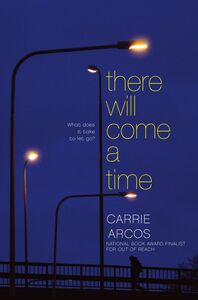Take a photo of a barcode or cover
In Lily, Arkansas, it is believed that a long extinct bird has reappeared. The town enters the spotlight and fully embraces the Lazarus Woodpecker. Cullen Whitter can’t understand what all of the fuss is about. However, his insightful younger brother, Gabriel, points out that this reemergence gives people hope. Later in the summer of the woodpecker, Gabriel goes missing. Cullen becomes frustrated that the town’s obsession with the bird is overshadowing the hunt for his little brother.
Alongside this painful tale, the reader is told about a missionary in Africa. His life affects those around him and in turn, those lives affect Cullen and his family. It is a story that highlights the interconnectivity of humans.
Alongside this painful tale, the reader is told about a missionary in Africa. His life affects those around him and in turn, those lives affect Cullen and his family. It is a story that highlights the interconnectivity of humans.
The writing was good but I could hardly stand the pace and the characters. The most interesting character, Gabriel, disappears for the majority of the book. Then, the ending is abrubt and we don't get to find out what happened! I felt like there was no momentum and some parts were just weird.
Debería darle una relectura porq cd lo leí en la eso no m enteré d nada creo, pero aún así m gustó así q supongo que es un buen libro
This is a quite uniquely written book, although reminiscent of Ava Lavender and Curious Incident in some ways. I really liked the protagonist, particularly his imagined scenes, which gave the ending a sense of disclarity that I personally really liked. The secondary story felt a bit odd at first, and took me a while to understand- I think it could have been made a little less twisty-turny, but the eventual realisation of how it all fitted together was superb.
It was extremely intriguing to see how the two seemingly unrelated stories tied together in the end. Not amazing, but quite good.
I read this book because it was on the reading list from one of my local high schools and the description sounded interesting. I really flew through this book, at the beginning I wasn't sure but once I gave it some time I couldn't put it down. It starts with two different stories and the way they come together really surprised me. Definitely a book I will recommend to my 10th graders coming in to the library looking for their summer reading book.
2.5 stars. I enjoyed certain parts of this book, but it confused me quite a bit. I don't really have anything more to say besides it wasn't an awful book but some things in it rubbed me wrong and the way it was written was a little weird. It was a kinda decent book.
I know I should appreciate this book. It had the feel of a really lovely indie Sundance film -- that I just didn't get.
I would recommend this book for mature eighth graders and up... for language and weirdness.
I would recommend this book for mature eighth graders and up... for language and weirdness.
Alright, so this book... was quite something. Upon realising that it was told in very distinct and seemingly unrelated POVs, I was intrigued. I wanted to know how the two storylines would converge, as it was rather obvious it would happen at some point. It was interesting to see how it developed and it managed to have me trying to guess how it would unfold.
The biggest problem I had with this book was its lack of female characters. I'm not saying they didn't exist, of course, but none of them actually contributed much to the story. Apart from Cullen's mom, that is. She might not have actively moved the story forward a lot, but it provided a nice comparison to Cullen's mourning (if we can call it that, since Gabriel didn't die, he went missing). On one hand, we had him not talking to anyone and shutting down for weeks after it happened. On the other hand, we had his mom acting as if everything was alright, only to completely fall apart weeks later, when it dawned on her that Gabriel might not actually return.
The characters were likeable and somewhat relatable, and the book managed to be funny while dealing with loss simultaneously.
Cullen Witter was, to me, a good narrator. Even if he seemed to be distant at times, he took his time and dealt with his brother's disappearance at his own pace. He made mistakes but all teenagers do, with or without missing family members.
Gabriel, on the other hand, actually felt like an angel. He seemed to be such a grounded and introspective character that I felt as though he had all the answers to the questions of the world. Yet, somehow, it was done in such a way that it didn't feel unrealistic to have a 15 y/o boy throwing wisdom left and right. It was comforting and, for some reason, I was proud of him.
Lucas was the most well-adjusted person in the aftermath of Gabriel's disappearance. He was a great friend, even if he sometimes didn't think through his actions, but I believe that was mostly fueled by the fact he saw Cullen and Gabriel as his brothers, and he'd do anything for them, which he couldn't for his late brother.
Benton sage was a character that, at first, intrigued me. I could see his need to do good in the world and his devotion to god were integral parts of who he was. But when I finally figured out how he came to become that person, with a dysfunctional family and cold-hearted father, I found myself not understanding the reasoning behind his life choices. I couldn't relate to someone who tried so hard to impress someone who didn't care. Ultimately, I would've like to see more of what was going through his mind for him to make the choices he made.
Cabot Searcy was the character that felt the most unrealistic. His slow yet sudden descent into madness didn't sit right with me and I think it could've been written in a more believable way. Nevertheless I still found it to be a very interesting part of the plot and it did leave me curious as to how the logic of the mystery would unfold.
Finally, the ending! It was this part that kept me thinking about Where Things Come Back days after I finished it, and I think it'll be what comes to mind when I remember it from now on. *SPOILERS* Throughout the book, there are quite a lot of paragraphs when Cullen, a first person narrator, starts narrating in the third person. This is done in a very peculiar way, in which he says "When one", and then proceeds to tell us one of his daydreams (which often include zombies). Now, how is this relevant, you may ask? Because the last paragraph of the book is told this way. And what happens in that paragraph? Gabriel comes back home. My question: did he really come back, or was it simply another of Cullen's daydreams?
The biggest problem I had with this book was its lack of female characters. I'm not saying they didn't exist, of course, but none of them actually contributed much to the story. Apart from Cullen's mom, that is. She might not have actively moved the story forward a lot, but it provided a nice comparison to Cullen's mourning (if we can call it that, since Gabriel didn't die, he went missing). On one hand, we had him not talking to anyone and shutting down for weeks after it happened. On the other hand, we had his mom acting as if everything was alright, only to completely fall apart weeks later, when it dawned on her that Gabriel might not actually return.
The characters were likeable and somewhat relatable, and the book managed to be funny while dealing with loss simultaneously.
Cullen Witter was, to me, a good narrator. Even if he seemed to be distant at times, he took his time and dealt with his brother's disappearance at his own pace. He made mistakes but all teenagers do, with or without missing family members.
Gabriel, on the other hand, actually felt like an angel. He seemed to be such a grounded and introspective character that I felt as though he had all the answers to the questions of the world. Yet, somehow, it was done in such a way that it didn't feel unrealistic to have a 15 y/o boy throwing wisdom left and right. It was comforting and, for some reason, I was proud of him.
Lucas was the most well-adjusted person in the aftermath of Gabriel's disappearance. He was a great friend, even if he sometimes didn't think through his actions, but I believe that was mostly fueled by the fact he saw Cullen and Gabriel as his brothers, and he'd do anything for them, which he couldn't for his late brother.
Benton sage was a character that, at first, intrigued me. I could see his need to do good in the world and his devotion to god were integral parts of who he was. But when I finally figured out how he came to become that person, with a dysfunctional family and cold-hearted father, I found myself not understanding the reasoning behind his life choices. I couldn't relate to someone who tried so hard to impress someone who didn't care. Ultimately, I would've like to see more of what was going through his mind for him to make the choices he made.
Cabot Searcy was the character that felt the most unrealistic. His slow yet sudden descent into madness didn't sit right with me and I think it could've been written in a more believable way. Nevertheless I still found it to be a very interesting part of the plot and it did leave me curious as to how the logic of the mystery would unfold.
Finally, the ending! It was this part that kept me thinking about Where Things Come Back days after I finished it, and I think it'll be what comes to mind when I remember it from now on. *SPOILERS* Throughout the book, there are quite a lot of paragraphs when Cullen, a first person narrator, starts narrating in the third person. This is done in a very peculiar way, in which he says "When one", and then proceeds to tell us one of his daydreams (which often include zombies). Now, how is this relevant, you may ask? Because the last paragraph of the book is told this way. And what happens in that paragraph? Gabriel comes back home. My question: did he really come back, or was it simply another of Cullen's daydreams?





